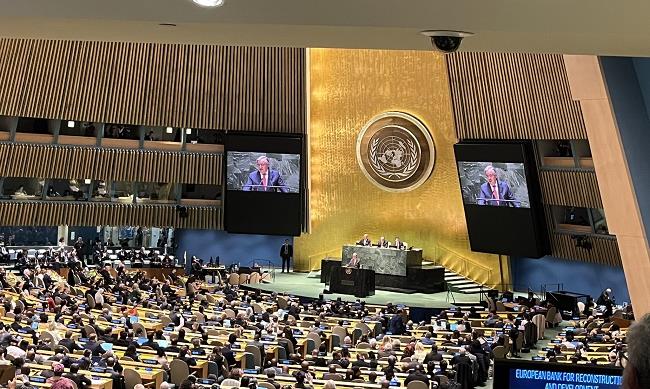Achieving water security and sustainable sanitation for all in Africa is possible by 2030 and is within the power of African leaders.

This is the key message from the International High-Level Panel on Water Investments for Africa, which released a landmark report, “Africa’s Rising Investment Tide”, on World Water Day on March 22, during the United Nations 2023 Water Conference in New York. Sixteen Heads of State and development leaders sit on the Panel.
The Panel’s report outlines three pathways to secure an additional $30 billion achieve water security and sustainable sanitation in Africa by 2030 on the continent:
- Pathway 1. Achieve more impactful water spending and financial leveraging
- Pathway 2. Mobilise Domestic Resources
- Pathway 3. Secure Global and Continental Investment and Finance
Approximately $50 billion annually, or $40 per African per year is required, to achieve water security and sustainable sanitation in Africa by 2030. Currently, $10-$19 billion is invested each year.
The Panel’s report signals an opportunity for a watershed investment partnership between African governments and institutional investors in Africa and abroad. The three proposed pathways outline how to unlock and scale an unprecedented pipeline of investable water projects through greater risk sharing between public and private finance. This would result in an unprecedented acceleration in both the pace and scale of financing that responds to the current global water and climate emergency.
Every $1 invested in climate-resilient water and sanitation returns at least US$7 in societal and economic gains through improvements in health, education, energy, food security, a healthy environment, gender equality, and sustainable development goals.
African countries are currently losing up to $200 billion/year due to insufficient investment, coupled with the impacts of climate change and inefficiencies. Over 300 million Africans do not have access to clean drinking water and over 700 million live without access to good sanitation. Without action, climate change will make water shortages worse and lead to more food insecurity, disease burden, human displacement, conflict, and obstruct the continent’s economic development.
The Panel proposes a five-point Action Plan for Heads of State and governments, business and global leaders, to support the implementation of the three actionable pathways.
- Establish cross-sectoral political leadership at the highest level, with commitment to substantially increase public budgets and investments for water security and sustainable sanitation.
- Track progress and enhance mutual accountability for results in the mobilisation of water investments and in peer review mechanisms at all governance levels. Recommit to allocation of at least 5% of national budgets for the water and sanitation sector and 0.5% of GDP per annum for sanitation and hygiene programmes.
- Mobilise new sources of funding and innovative finance by supporting matchmaking with a special focus on climate resilient, blended public-private finance, and gender transformative approaches.
- Strengthen institutional regulation for water investments, create incentives and penalties for increased water efficiency across multiple industries to lead water stewardship efforts, biodiversity, and ecosystem protection.
- Use ODA to de-risk water investments and leverage larger funding streams.
The Panel is a registered Water Action Agenda, and will help deliver on the water actions in the 2030 Agenda for Sustainable Development. The report will inform the High-Level Panel Investment Plan to be released during the 2023 SDG Summit in September 2023.
Macky Sall, President of Republic of Senegal (Panel Co-Chair), said: “Some $10-19 billion is invested each year in Africa, while at least $30 billion/year is required to achieve water security by 2030. There is therefore a need to close the gap by intensifying advocacy and, above all, action.”
Mark Rutte, Prime Minister of the Kingdom of the Netherlands (Co-Chair): “The Netherlands was honoured to provide advice to this great African-led initiative. Now the real work begins: developing the programmes, creating the conditions, getting investors ready to step in! The UN 2023 Water Conference is the place to connect those dots.”
Jakaya Kikwete, former President of United Republic of Tanzania (Alternate Co-Chair): “If we don’t achieve water security and sustainable sanitation on the African continent, we will fail at all of the Sustainable Development Goals. The appropriate development, governance and use of water resources is therefore a central part of the African continent’s overall development trajectory and will drive that development as well as offer significant employment opportunities. The release of this report marks a watershed moment. We are offered an opportunity to change course and reconsider the way we are think about investing in water and sanitation.”
